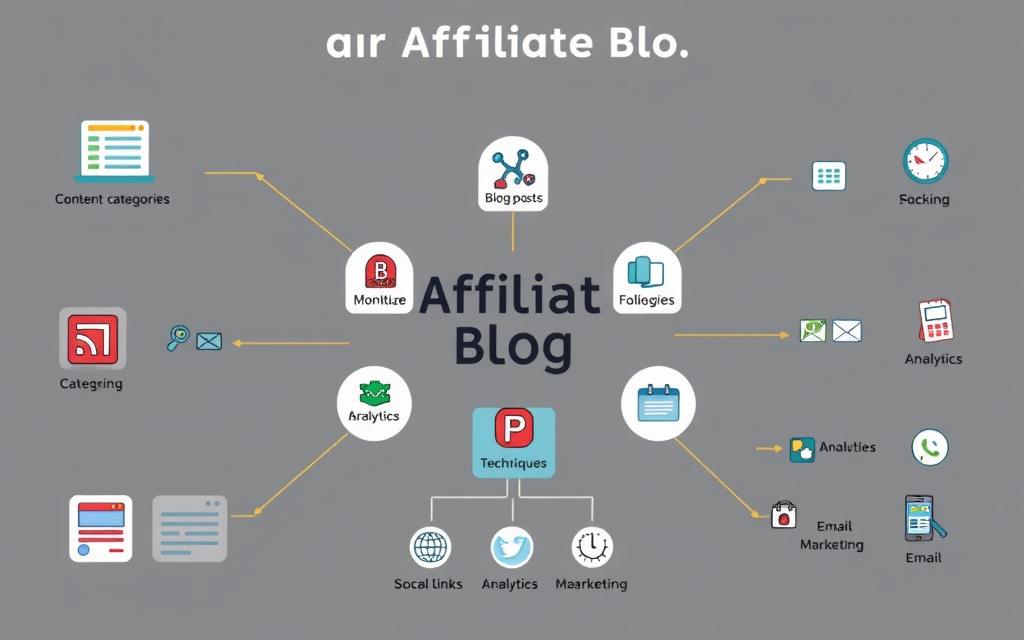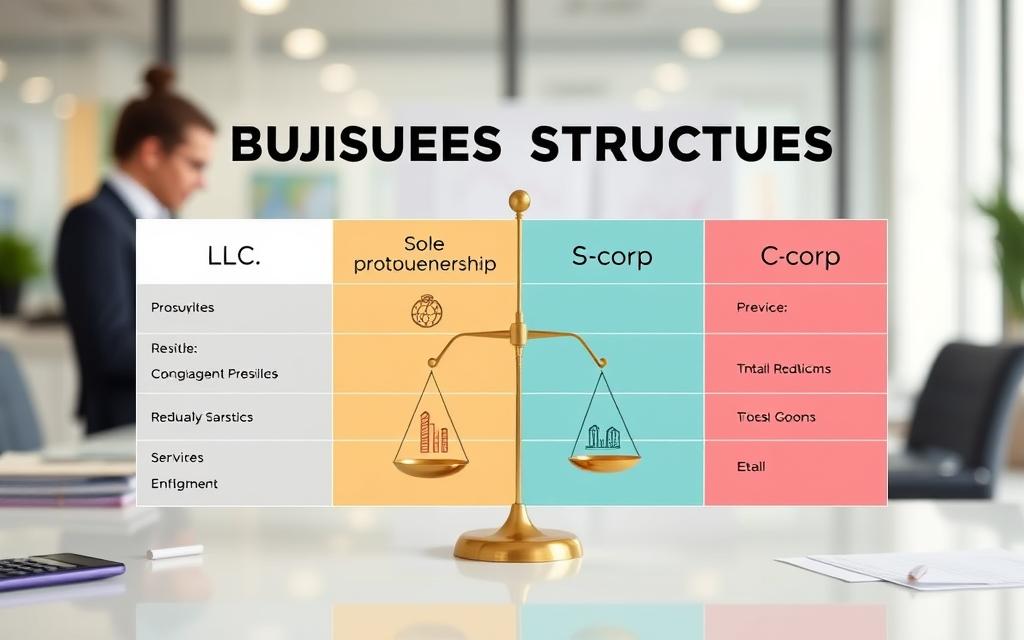As an affiliate marketer, choosing between an LLC and a Corporation for your blog matters a lot. Both have their own benefits and drawbacks. The right choice depends on your goals, how much money you make, and how big you want your business to grow.
Key Takeaways
- Understand the fundamental differences between LLCs and Corporations to make an informed decision
- Analyze the management structure, ownership flexibility, and tax implications of each entity
- Weigh the advantages and disadvantages of LLCs and Corporations to determine the best fit for your affiliate blog
- Consider the tax considerations, including pass-through taxation for LLCs and corporate tax rates
- Evaluate your business goals, revenue potential, and growth aspirations to select the right structure
Introduction to Business Structures
Choosing a legal structure for your business is a big decision. It affects your affiliate blog a lot. You have two main options: Limited Liability Companies (LLCs) and Corporations. Let’s dive into what each offers and how they might shape your blog.
Overview of LLCs
An LLC is a mix of a partnership and a corporation. It’s easy to start and keep running. This makes it a favorite for small businesses and solo entrepreneurs. It protects your personal stuff from your business’s problems.
Overview of Corporations
Corporations are more formal and have their own legal identity. They need a team to run them, with shareholders, directors, and officers. They’re great for growing your business or getting investors. But, they have stricter rules to follow.
Knowing the differences between LLCs and Corporations is key. It helps you pick the right one for your blog. The choice affects how you manage, pay taxes, and grow your blog.
“The choice between an LLC and a Corporation can have significant implications for your blog’s management, taxation, and growth potential.”
Key Differences Between LLCs and Corporations
Choosing the right business structure for your affiliate blog is crucial. It affects how you manage your business, handle ownership, and deal with taxes. Knowing the differences between LLCs and corporations is key.
Management Structure
LLCs offer a flexible management setup. You can choose between member-managed or manager-managed models. This is great for small affiliate blogs where owners want to be hands-on. Corporations, however, have a more formal setup. They have a board of directors and shareholders making big decisions.
Ownership Flexibility
LLCs make it easy to transfer or sell ownership interests. This flexibility is a big plus for small affiliate blogs. Corporations, though, have stricter rules. This can make it hard to bring in new investors or change the ownership.
Tax Implications
LLCs are taxed as pass-through entities. This means profits and losses are reported on personal tax returns. It’s a big advantage for small affiliate blogs wanting to avoid double taxation. Corporations, on the other hand, face corporate income tax. Shareholders may also be taxed on distributions, leading to double taxation.
| Feature | LLCs | Corporations |
|---|---|---|
| Management Structure | Flexible: member-managed or manager-managed | Formal: board of directors and shareholders |
| Ownership Flexibility | Greater flexibility in transferring or selling ownership interests | Stricter rules around the transfer of stock |
| Tax Implications | Pass-through taxation, avoiding double taxation | Subject to corporate income tax, potential for double taxation |
Understanding these differences helps you choose the best structure for your affiliate blog. Whether it’s AI data analysis or AI personalization you aim to use, the right structure matters.
Advantages of Forming an LLC
Starting a successful affiliate blog can be a big decision. You have to choose between an LLC and a corporation. An LLC offers many benefits that make it a great choice for your blog.
Personal Asset Protection
An LLC protects your personal assets. This means your home, savings, and other belongings are safe from your blog’s debts. It’s a big plus for your peace of mind and financial security.
Simplicity in Management
LLCs are easy to manage. They need less paperwork than corporations. This is great for solo entrepreneurs or small blogs. You can spend more time on your content and less on paperwork.
Tax Benefits
LLCs have tax perks for affiliate bloggers. They are pass-through entities. This means profits and losses go straight to the owners. They then report these on their personal tax returns. This can save a lot of money, especially for those in higher tax brackets.
Thinking about an LLC for your blog is a smart move. It can help you reach your business goals. Remember, choosing between an LLC and a corporation is a big decision. Take your time and get advice from a professional.

Disadvantages of LLCs
LLCs have many benefits, but they also have some downsides. Two main issues are the limited growth potential and the possibility of self-employment taxes.
Limited Growth Potential
One big problem with LLCs is their growth limits. They work best for small to medium-sized businesses. These businesses don’t need a lot of outside money or fast growth.
LLCs’ structure makes it hard to get big funding or go public. These are common steps for bigger companies.
Possible Self-Employment Taxes
Another issue with LLCs is self-employment taxes. Unlike corporations, LLCs don’t separate business and owner taxes. This means LLC owners have to pay self-employment taxes on their profits.
This can be a big financial challenge. Affiliate bloggers need to think about these taxes when planning their business.
In summary, LLCs have growth limits and can lead to self-employment taxes. It’s important to consider these downsides against the benefits like asset protection and easy management. This will help you choose the best structure for your affiliate blog.
Advantages of Forming a Corporation
Turning your affiliate blog into a corporation has many benefits. Two big ones are easier access to money and unlimited growth.
Easier to Raise Capital
Being a corporation makes it simpler to get money. You can sell stock to attract investors. This is great for growing your blog and reaching more people.
Unlimited Growth Potential
Another big plus is unlimited growth. Corporations can grow without the limits of LLCs. This lets your blog adapt to new trends and take on big projects.
| AI Content Generation | AI Chatbots |
|---|---|
| AI can make your blog’s content better and more consistent. This means your content will be engaging and easy to find online. | AI chatbots can make your blog’s customer service better. They offer a more personal experience, which can lead to more sales and money. |
By becoming a corporation, your blog can grow and succeed over time. This helps you stay competitive in the fast-changing online world.
Disadvantages of Corporations
Corporations have many benefits, like making it easy to get money and grow without limits. But, they also have downsides. The main issues are the complexity in following rules and the risk of being taxed twice.
Complexity in Compliance
Corporations deal with a lot of rules, more than LLCs. They must hold regular meetings, keep detailed records, and file a lot of paperwork. This can take up a lot of time and money, especially for small businesses.
Double Taxation
Corporations face a problem called “double taxation.” First, they are taxed on their profits. Then, when they give money to shareholders as dividends, those shareholders are taxed again. This can really cut down on the money left for the corporation’s owners.
| Metric | LLC | Corporation |
|---|---|---|
| Tax Structure | Pass-through taxation | Double taxation |
| Compliance Complexity | Relatively simple | Highly complex |
| Ownership Flexibility | Flexible | Restricted |
Choosing between an LLC and a corporation for a blog depends on what you want for your business. Think about the pros and cons and the tax rules. This will help you decide what’s best for your future.
Tax Considerations for Your Blog
As an affiliate blogger, knowing about taxes is key. The structure of your blog affects your taxes. Choosing between an LLC or a corporation changes how you’re taxed, impacting your earnings.
Pass-Through Taxation for LLCs
LLCs are great because they don’t pay federal income tax. Instead, the owners report the business’s income and losses on their personal tax returns. This makes taxes simpler and can save you money.
Corporate Tax Rates
Corporations, on the other hand, face a 21% federal tax rate. Shareholders also pay personal income tax on dividends, leading to double taxation. This is something to think about if you expect your blog to make a lot of money.
Choosing between an LLC and a corporation depends on your goals and how much money you think you’ll make. Talking to a tax expert can help you pick the best option for your blog’s future.
| Tax Consideration | LLC | Corporation |
|---|---|---|
| Tax Structure | Pass-through taxation | Corporate tax rate |
| Potential for Double Taxation | No | Yes |
| Tax Filing Complexity | Simpler | More Complex |
Which Structure Fits Your Blog’s Needs?
Choosing between an LLC or a corporation for your affiliate blog is key. You need to think about your business goals and how much money you might make. This choice affects your blog’s structure, management, and taxes.
Assessing Your Business Goals
First, think about what you want from your affiliate blog. Do you want a simple setup that protects your assets? Or do you see your blog growing and needing more money?
Your goals will help decide the best legal structure for you.
Analyzing Revenue Potential
Next, think about how much money you might make. If you expect a steady, small income, an LLC might be perfect. It’s simple and offers tax benefits.
But, if you think you’ll make a lot of money and need investors, a corporation is better. It lets you grow and get more money.
| Factors to Consider | LLC | Corporation |
|---|---|---|
| Management Structure | Flexible, member-managed or manager-managed | Hierarchical, with shareholders, directors, and officers |
| Ownership Flexibility | Easier to add or remove members | Shareholders must approve significant changes |
| Tax Implications | Pass-through taxation, avoiding double taxation | Subject to corporate tax rates, potential for double taxation |
By thinking about your goals and how much money you might make, you can choose wisely. An LLC or a corporation can help your blog succeed and grow.
Real-Life Examples of LLCs vs Corporations
In the world of affiliate blogging, both LLCs and corporations have proven to be successful business structures. Let’s dive into real-life examples showcasing the performance and advantages of each structure.
Successful Affiliate Blogs as LLCs
One prime example of a thriving affiliate blog operating as an LLC is Wirecutter. It’s a product review and recommendation website acquired by The New York Times in 2016. Wirecutter was founded in 2011 as an LLC, allowing the founders to maintain a flexible management structure and benefit from pass-through taxation while providing personal asset protection.
Another successful LLC-based affiliate blog is The Penny Hoarder. It’s a personal finance and money-saving resource that has grown into a multi-million-dollar business. The Penny Hoarder’s LLC structure has enabled the founders to scale the business while enjoying the tax advantages and simplicity of an LLC.
Successful Affiliate Blogs as Corporations
In contrast, some affiliate blogs have chosen to incorporate as corporations, leveraging the benefits of a more structured business model. A prime example is Nerd Wallet, a personal finance and consumer advice website that went public in 2021 after operating as a corporation since its inception.
Another successful affiliate blog that has thrived as a corporation is The Motley Fool. It’s a renowned finance and investment advice platform. The Motley Fool’s corporate structure has allowed it to raise significant capital and expand its reach, making it a leading voice in the financial media industry.
| Affiliate Blog | Business Structure | Key Advantages |
|---|---|---|
| Wirecutter | LLC | Flexible management, pass-through taxation, personal asset protection |
| The Penny Hoarder | LLC | Tax advantages, simplicity in management |
| Nerd Wallet | Corporation | Ability to raise capital, structured business model |
| The Motley Fool | Corporation | Capacity for growth and expansion |
These real-life examples demonstrate that both LLCs and corporations can be successful business structures for affiliate blogs. The choice depends on the specific goals and needs of the organization. Carefully evaluating the pros and cons of each option is crucial in determining the best fit for your website AI automation and AI content generation endeavors.

Conclusion: Making the Right Choice
Exploring LLCs and corporations shows that the best choice for your affiliate blog depends on your goals. Both have their own benefits and things to think about. You need to carefully look at these points.
Recap of Key Points
LLCs protect your personal assets, have simpler management, and good tax benefits. They are great for many affiliate bloggers. Corporations, however, let you raise more capital and grow without limits. This is good for blogs that want to grow big.
Final Recommendations
When choosing between an LLC or a corporation, think about your blog’s needs now and in the future. Look at your blog’s income, growth plans, and how much complexity you can handle. Get advice from legal and tax experts to make a choice that helps your blog succeed long-term.
By looking at the good and bad of each, you can pick the best path for your affiliate blog’s journey.












Leave a Reply